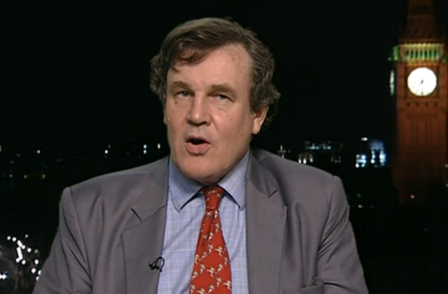
Telegraph chief political commentator Peter Oborne has accused his paper of “a form of fraud” by allowing commercial considerations to censor its coverage of the bank HSBC.
Oborne resigned from the paper in protest in December at what he sees as its lack of integrity.
He has been on gardening leave this year while working out his six-months' notice.
Oborne said he had planned to keep his silence but was moved to speak out by the paper’s scant coverage of the HSBC Swiss banking scandal over the last week.
Speaking on Channel 4 News last night Oborne (pictured above) said that "nothing unfavourable of any substance" has been written about HSBC in the Telegraph over the last two years for fear of losing its advertising.
Oborne said: "The Telegraph needs to explain to us why its coverage of HSBC has been skewed, and the really important people who it should explain this to are the readers of The Daily Telegraph."
He added: "I've had so many conversations with Telegraph staff. I believe I am speaking for the vast majority of Telegraph staff that we have no confidence in the chief executive Murdoch MacLennan and I'd go further than that and say we have no confidence at all in the Barclay brothers who own the paper."
He has aired his concerns in an excoriating piece written on the website Open Democracy.
According to Oborne, events at the Telegraph have become “more and more dismaying” since the arrival of head of content Jason Seiken in late 2013 and the sacking of Daily Telegraph editor Tony Gallagher in January 2014.
The sacking of half of the Telegraph’s sub-editors has seen, Oborne writes, “unthinkable” mistakes appearing in print.
He notes that on 22 September the Telegraph ran an online story about a woman with three breasts even though it was known to be false.
Oborne said: “With the collapse in standards has come a most sinister development. It has long been axiomatic in quality British journalism that the advertising department and editorial should be kept rigorously apart. There is a great deal of evidence that, at the Telegraph, this distinction has collapsed."
A piece Oborne wrote about HSBC closing the bank accounts of well-known British Muslims was spiked because, an executive told him, “there is a bit of an issue” with HSBC.
He noted than on 10 May last year the Telegraph ran a long feature on Cunard’s Queen Mary II liner in the news review page which “looked to many like a plug for an advertiser”.
Cunard is said to be an important advertiser for the Telegraph.
Oborne said he was told in person by Telegraph chief executive Murdoch MacLennan there was a long history of advertising affecting editorial on the Telegraph and that it was “not as bad as all that”.
On the paper’s coverage of the “HSBC files”, broken by The Guardian and BBC last week and widely followed up across the media, he said: "You needed a microscope to find the Telegraph coverage: nothing on Monday, six slim paragraphs at the bottom left of page two on Tuesday, seven paragraphs deep in the business pages on Wednesday. TheTelegraph’s reporting only looked up when the story turned into claims that there might be que”tions about the tax affairs of people connected to the Labour party."
According to Oborne, the Telegraph has treated HSBC with kid gloves since an investigation by the paper into its Jersey bank accounts in 2012.
Oborne said: "From the start of 2013 onwards stories critical of HSBC were discouraged. HSBC suspended its advertising with the Telegraph. Its account, I have been told by an extremely well informed insider, was extremely valuable. HSBC, as one former Telegraph executive told me, is 'the advertiser you literally cannot afford to offend'."
Explaining his decision to speak out, Oborne said: "A free press is essential to a healthy democracy. There is a purpose to journalism, and it is not just to entertain. It is not to pander to political power, big corporations and rich men. Newspapers have what amounts in the end to a constitutional duty to tell their readers the truth.
"It is not only the Telegraph that is at fault here. The past few years have seen the rise of shadowy executives who determine what truths can and what truths can’t be conveyed across the mainstream media.
"The criminality of News International newspapers during the phone-hacking years was a particularly grotesque example of this wholly malign phenomenon. All the newspaper groups, bar the magnificent exception of The Guardian, maintained a culture of omerta around phone-hacking, even if (like the Telegraph) they had not themselves been involved. One of the consequences of this conspiracy of silence was the appointment of Andy Coulson, who has since been jailed and now faces further charges of perjury, as director of communications in 10 Downing Street."
Telegraph Media Group said in a statement: "Like any other business, we never comment on individual commercial relationships, but our policy is absolutely clear.
"We aim to provide all our commercial partners with a range of advertising solutions, but the distinction between advertising and our award-winning editorial operation has always been fundamental to our business.
"We utterly refute any allegation to the contrary.
"It is a matter of huge regret that Peter Oborne, for nearly five years a contributor to the Telegraph, should have launched such an astonishing and unfounded attack, full of inaccuracy and innuendo, on his own paper."
Email pged@pressgazette.co.uk to point out mistakes, provide story tips or send in a letter for publication on our "Letters Page" blog

